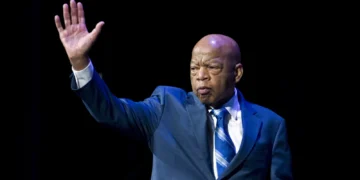July 17, 2025 Story by: Editor
William Lacy “Bill” Clay Sr., a pioneering civil rights advocate and Missouri’s first Black member of Congress, has died at the age of 94, according to a statement released by his family. Clay served Missouri’s 1st Congressional District for over three decades, becoming a powerful voice for workers’ rights, racial justice, and equitable urban policy.
The former congressman died surrounded by family on July 17. In his 32 years in office, Clay helped transform the political landscape in St. Louis and nationally, using his post to champion legislation that prioritized labor protections, voting rights, and environmental justice for marginalized communities.
His effort to replace Frank Karsten, a 22-year incumbent, had begun. He defeated five candidates for the nomination before facing Curtis Crawford, an African American who was a former St. Louis assistant circuit attorney, in the general election.
The race ensured that Missouri would elect its first Black member of the U.S. House of Representatives. It turned out to be Clay, who garnered 64% of the vote.
He won on the issues he had long championed in and out of politics: greater employment opportunities and civil rights for African Americans.
His freshman class included two other history-making African Americans: Shirley Chisolm of New York, the first Black woman elected to Congress, and Louis Stokes, the first Black congressman elected in Ohio. His 16 two-year terms made Congressman Clay the longest serving of the three.
Nixon had initially refused to meet with the group. Clay drafted a letter that informed him that the caucus would be boycotting Nixon’s 1971 State of the Union address.
Nixon met with the caucus later that year.

A portrait of Clay midway through his long tenure in Congress. (Photo courtesy of: Wiley Price)
A Lifelong Advocate for Justice
First elected in 1968, Bill Clay served from 1969 to 2001. During that time, he built a legacy rooted in activism and political tenacity. A native of St. Louis and a product of its public schools, Clay rose from a background in journalism and labor organizing to become one of the most respected lawmakers in the House.
He served on the Committee on Education and Labor, the Post Office and Civil Service Committee and the Joint Committee on the Library. He sponsored revisions to a pension law that was incorporated in the Tax Reform Act of 1986.
Keeping faith with labor, he threw his support behind the mandatory notification of plant closings and the protection of unions’ negotiating rights. He also sponsored legislation to prohibit the permanent replacement of striking workers.
Clay worked 20 years to revise the 1939 Hatch Act, which restricted the political activities of federal workers. His measure became law in 1993.
He supported the Family and Medical Leave Act, which also passed in 1993. The act mandated that companies with more than 50 workers offer up to 12 weeks of unpaid leave for employees to care for a newborn or attend to a family medical emergency.
President Bill Clinton signed both measures, which had been vetoed by President George H.W. Bush.
But he didn’t always see eye to eye with Clinton. Clay strenuously disagreed with the president on the North American Free Trade Agreement. He feared NAFTA would further decrease workers’ wages and strengthen management’s hand.
He lost the NAFTA battle, but in 1996, he guided a bill through the House to raise the federal minimum wage.
Before entering Congress, Clay was arrested during the Civil Rights Movement for participating in a demonstration against discriminatory hiring practices at Jefferson Bank & Trust. That early experience shaped his lifelong belief in protest as a tool for change.
Clay founded an active NAACP Youth Council chapter and became involved with the Congress for Racial Equality, joining with other local civil rights stalwarts like Norman Seay, Percy Green, Bob Curtis and Charles and Marian Oldman.
Over his 32-year career, Clay championed civil rights, labor protections, and education reform. As a senior member of the Education and Labor Committee, he played a central role in crafting legislation that advanced worker safety, job training, and collective bargaining. His long tenure in Congress reflected a deep commitment to equity and public service, earning him a legacy as one of the most impactful Black lawmakers of his generation.
In Congress, he was a founding member of the Congressional Black Caucus, where he pushed for civil rights enforcement, voting access, and economic opportunity for Black Americans and other historically excluded groups.

Congressional Black Caucus Members with Actor Melvin Van Peebles outside the U.S. Capitol. Left to Right: Rep. Augustus Hawkins (D-Calif.); Rep. William Clay, Sr.(D-Mo.); Rep. Parren Mitchell (D-Md.); Rep. Robert Nix, Sr. (D-Pa.); Rep. Ronald Dellums (D-Calif.); Melvin Van Peebles; Rep. Louis Stokes (D-Ohio); Rep. Yvonne B.Burke (D-Calif.); Rep. Charles Rangel (D-N.Y.); and Rep. Barbara Jordan (D-Texas).(Photo courtesy of: Moorland-Springarn Research Center, Howard University)
Congressional Black Caucus press release:
Today, Congressional Black Caucus Chair Yvette D. Clarke (NY-09) and members of the Congressional Black Caucus issued the following statement:
“It is with deep respect and profound sadness that we mourn the passing of former Congressman Bill Clay Sr. of Missouri. On behalf of the 61 members of the Congressional Black Caucus, I extend our deepest condolences to his family, friends, and loved ones. We are keeping his entire family in our prayers during this difficult time, including his beloved son, former Congressman Lacy Clay Jr., who succeeded him in representing the people of Missouri in the U.S. House of Representatives.
“Congressman Clay was a principled leader and a tireless advocate for civil rights and economic justice. Born in St. Louis in 1931, he brought the conscience of the movement with him to the halls of Congress, where he served honorably for more than three decades. As Missouri’s first Black member of Congress, he fought tirelessly to open doors of opportunity and to protect the rights of working people across our nation.
“A founding member of the Congressional Black Caucus in 1971, Congressman Clay helped build the CBC into a force for equity and accountability in American democracy. As a member of Congress, he was a fierce defender of labor rights, education, and social justice. His voice carried the strength of conviction and the clarity of purpose that helped shape a more inclusive nation.
“Congressman Bill Clay leaves behind a legacy of dignity, courage, and transformative impact. His work laid the foundation for future generations of Black leadership in public service. May he rest in power and everlasting peace.”
Champion of Labor and the Environment
Clay’s career was particularly defined by his labor advocacy. He chaired the House Subcommittee on Labor-Management Relations, where he authored and supported legislation to strengthen workplace protections, improve pensions, and expand workers’ bargaining rights.
He was also an early advocate for environmental protections in low-income communities, pushing the federal government to address industrial pollution in predominantly Black neighborhoods.
A Legacy Passed Down
Clay retired from Congress in 2001, succeeded by his son, William Lacy Clay Jr., who held the seat until 2021. The Clay family became synonymous with public service in St. Louis, earning a reputation for delivering constituent services while advancing civil rights and urban development legislation.
Clay Sr. was also an author and political commentator in his later years. He penned several books, including Just Permanent Interests: Black Americans in Congress, 1870-1991, which chronicled the history of African American legislators and their collective influence.

House Education and Workforce ranking Democrat William L. Clay, D-Mo., and Chairman Bill Goodling, R-Pa., during the markup. (Photo courtesy of: Scott J. Ferrell/Congressional Quarterly/Getty Images)
Tributes Across the Political Spectrum
In the hours after his death, tributes poured in from across Missouri and the nation. U.S. Rep. Cori Bush, who now represents Clay’s former district, called him a “trailblazer and titan for justice.” Missouri Governor Mike Parson ordered flags to be flown at half-staff in his honor, calling Clay “a statesman whose integrity and leadership left a mark on our state’s history.”
Final Reflections
William “Bill” Clay Sr.’s death marks the end of an era for Missouri politics and the broader civil rights movement. His advocacy shaped labor policy, advanced racial equity, and helped embed civil rights into the legislative process. His impact will live on through his writing, his family’s continued public service, and the countless lives improved by his decades of tireless work in Congress.
Source: STLPR / Congressional Black Caucus












![U.S. Congressman Byron Donalds chuckles while former President and Republican presidential candidate Donald Trump gives a keynote address at the Black Conservative Federation gala dinner on February 23, 2024. [Alyssa Pointer/Reuters]](https://blkpoliticsnow.com/wp-content/uploads/2024/10/DSADSA-120x86.png)




